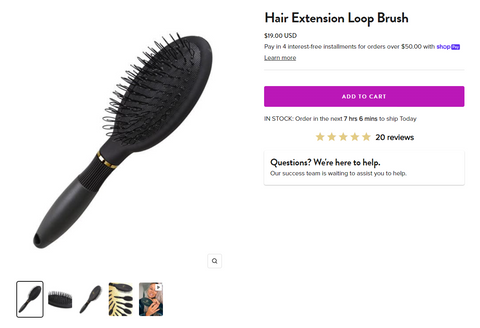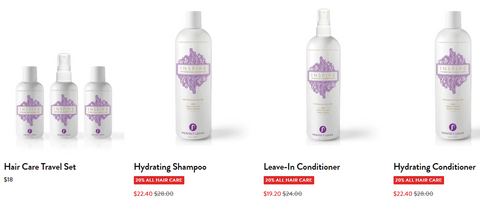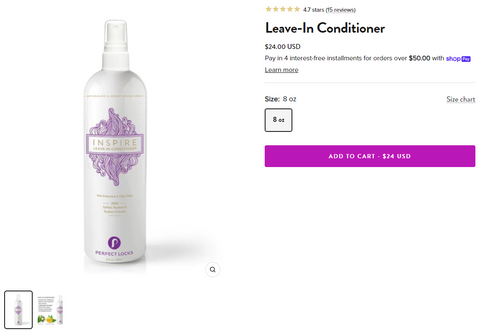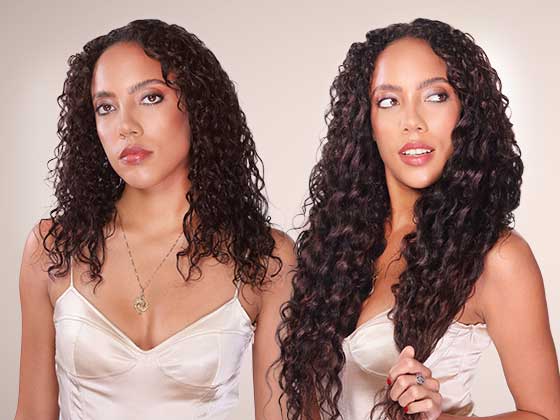Hair breakage can be a frustrating and common problem for many people. Whether you have long or short hair, thin or thick strands, everyone is at risk of experiencing hair breakage at some point in their lives. But what causes hair to break, and how can you prevent it?
In this article, we will explore the top causes of hair breakage and provide tips on how to avoid them. From heat damage to chemical treatments and poor hair care habits, there are a number of factors that can contribute to broken hair. By understanding these causes and taking steps to address them, you can maintain strong, healthy hair and reduce the risk of breakage. So if you're ready to learn more about preventing hair breakage, read on!
The Top Causes of Hair Breakage and How to Avoid Them
Cause #1: Heat Damage
Heat styling tools such as hair dryers, flat irons, and curling wands can be great for achieving a variety of hairstyles, but they can also be damaging to your hair if not used properly. Heat can strip the hair of its natural moisture and proteins, causing it to become dry, brittle, and prone to breakage. To prevent heat damage and keep your hair healthy, it's important to follow some simple tips:
- Use a heat protectant: Before applying heat to your hair, be sure to use a heat protectant spray or serum. These products can help create a barrier between your hair and the heat, reducing the risk of damage.
- Don't apply heat to wet hair: It's important to let your hair dry completely before applying heat, as wet hair is more vulnerable to damage.
- Use a lower heat setting: If your styling tools have heat settings, opt for a lower temperature to minimize damage.
- Don't apply heat too often: Try to limit the use of heat styling tools, and give your hair a break whenever possible.
You can help protect your hair from heat damage and reduce the risk of breakage if you avoid heat that could potentially damage your hair. Remember, healthy hair is more resistant to breakage, so taking care of your hair is essential to maintaining strong, healthy strands.
Cause #2: Chemical Damage
Certain chemicals found in hair dyes, perms, and other hair treatments can be harsh on the hair and lead to breakage. These chemicals can strip the hair of its natural oils and proteins, leaving it dry and brittle. To minimize the risk of chemical damage and keep your hair healthy, consider the following tips:
- Choose natural alternatives: If you want to color your hair, opt for natural dyes that are made from plant-based ingredients. These dyes are less harsh on the hair and can help minimize the risk of damage.
- Consider a keratin treatment: If you're looking for a way to straighten or smooth your hair, consider a keratin treatment instead of a traditional perm. Keratin treatments use a protein to smooth and straighten the hair, rather than harsh chemicals.
- Protect your hair before chemical treatments: Before applying any chemical treatment to your hair, be sure to use a deep conditioning treatment to help protect your hair and reduce the risk of damage.
You can help minimize the risk of chemical damage to your hair and keep it healthy and strong by following these tips. It's important to be mindful of the products you use on your hair and to choose ones that are as natural and nourishing as possible.
Cause #3: Lack of Moisture
Dry hair is more prone to breakage, as the lack of moisture can cause the hair to become brittle and weak. To keep your hair hydrated and healthy, try the following tips:
- Use a deep conditioning treatment: Applying a deep conditioning treatment to your hair can help add moisture and nourishment, reducing the risk of breakage.
- Limit the use of hot water: Hot water can strip the hair of its natural oils, leaving it dry and prone to breakage. Try washing your hair with lukewarm water instead, and finish with a cold water rinse to help seal in moisture.
- Avoid over-styling: Using heat styling tools and applying products to your hair on a daily basis can strip it of moisture. Try to give your hair a break from styling and products whenever possible, and consider using a leave-in conditioner to help add moisture.
By keeping your hair hydrated and nourished, you can help reduce the risk of breakage and maintain strong, healthy hair. Moisture is an important factor in maintaining healthy hair, so be sure to prioritize hydration in your hair care routine.
Cause #4: Poor Hair Care Habits
Certain hair care habits can lead to breakage, such as using a brush with stiff bristles, tying hair too tightly, or using the wrong hair care products. To prevent breakage and maintain healthy hair, consider the following tips:
- Use a wide-tooth comb: A wide-tooth comb is less likely to snag on tangles and can help minimize breakage.
- Avoid tight ponytails: Tight ponytails or buns can put unnecessary strain on the hair and lead to breakage. Instead, opt for looser styles or use hair ties with a softer material.
- Choose the right hair care products: Using the wrong hair care products can strip the hair of its natural oils and nutrients, leading to dryness and breakage. Look for products that are suitable for your hair type and that are free of harsh chemicals.
By being mindful of your hair care habits, you can help prevent breakage and maintain healthy, strong hair. It's important to be gentle with your hair and to choose hair care products that nourish and protect the hair.

Cause #5: Genetic Factors
While some people may be more prone to hair breakage due to genetics, there are still steps that can be taken to prevent or minimize breakage. If you have a family history of hair breakage or thinning hair, you may want to consider seeking the advice of a dermatologist or hair care professional for personalized recommendations. They can assess your hair type and scalp health, and provide recommendations for products and practices that can help support healthy hair growth and reduce the risk of breakage.
By taking a holistic approach to hair care, you can help prevent breakage and maintain strong, healthy hair. Remember, while genetics can play a role in hair health, there are still steps you can take to support healthy hair growth and prevent breakage.
Additional Tips to Avoid Hair Breakage
Tip #1: Protect Hair from External Factors
External factors such as harsh weather and chlorine can be especially damaging to the hair during the winter months, when the air is dry and the sun's rays are weaker. Cold temperatures can cause the hair to become dry and brittle, while wind can tangle and break the hair. In addition to harsh weather, chlorine can also be damaging to the hair. Chlorine is a strong chemical that can strip the hair of its natural oils, leaving it dry and brittle.
- Wear a hat in cold or windy weather: Exposure to cold or windy weather can cause the hair to become dry and brittle, leading to breakage. To protect your hair, consider wearing a hat or scarf to shield it from the elements.
- Use a swim cap when swimming: Chlorine in swimming pools can strip the hair of its natural oils and lead to dryness and breakage. To protect your hair while swimming, consider wearing a swim cap or using a leave-in conditioner before swimming to create a barrier between your hair and the chlorine.
- Avoid using rubber bands: Rubber bands can pull and stretch the hair, leading to breakage. Opt for hair ties with a softer material, such as fabric, to minimize damage.
By protecting your hair from external factors, you can help prevent breakage and maintain healthy, strong hair. It's important to be mindful of the environment and to take steps to protect your hair from damaging elements.
Tip #2: Choose the Right Hair Care Products
Using the wrong hair care products can strip the hair of its natural oils and nutrients, leading to dryness and breakage. To prevent this, it's important to choose the right products for your hair type and needs.
For example, if you have dry, damaged hair, you may want to look for products that are formulated to nourish and repair the hair. These products may contain ingredients such as keratin, argan oil, and avocado oil, which can help restore moisture and strengthen the hair. You may also want to look for products that are sulfate-free, as sulfates can strip the hair of its natural oils and lead to dryness.
If you have oily hair, you may want to look for products that are lightweight and oil-free. These products can help to balance the scalp's natural oils and prevent the hair from becoming greasy. You may also want to consider using a clarifying shampoo once a week to help remove build-up of oils and product from the hair.
If you have color-treated hair, it's important to choose products that are formulated for color-treated hair. These products can help to protect the hair's color and prevent fading. Look for products that contain ingredients such as keratin and argan oil, which can help to nourish and protect the hair.

Tip #3: Eat a Healthy, Balanced Diet
A healthy, balanced diet is important for maintaining healthy hair because it provides the body with the nutrients it needs to support healthy hair growth. When the body is deficient in certain nutrients, it can affect the health of the hair. For example, a deficiency in protein can lead to dry, brittle hair that is prone to breakage. Similarly, a deficiency in iron can cause the hair to become thin and weak, increasing the risk of breakage. By ensuring that your diet is rich in the nutrients that support healthy hair growth, such as protein, iron, and vitamins, you can help prevent breakage and maintain healthy, strong hair.
Here are some foods to consider incorporating into your diet to support healthy hair:
- Eggs: Eggs are a great source of protein, which is essential for healthy hair growth. They are also high in biotin and other B vitamins, which can help support healthy hair.
- Nuts: Nuts, such as almonds and walnuts, are a good source of protein and healthy fats, which can help nourish the hair. They are also high in zinc, which can help support healthy hair growth.
- Leafy greens: Leafy greens, such as spinach and kale, are high in vitamins A and C, which can help support healthy hair growth. They are also a good source of iron, which is important for preventing hair loss.
- Omega-3 fatty acids: Omega-3 fatty acids can help nourish the hair and promote healthy hair growth. Good sources of omega-3 fatty acids include fatty fish such as salmon, nuts, and seeds.
- Zinc: Zinc is important for healthy hair growth and can help to prevent hair loss. Good sources of zinc include nuts, seafood, and whole grains.
- Vitamin E: Vitamin E is an antioxidant that can help to protect the hair from damage. It can also help to improve the hair's elasticity, reducing the risk of breakage. Good sources of vitamin E include nuts, seeds, and vegetable oils.
Tip #4: Maintain a Healthy Scalp
A healthy scalp is important for preventing hair breakage and promoting healthy hair growth. A scalp that is dry or flaky can lead to hair that is dry and prone to breakage. To maintain a healthy scalp and prevent breakage, consider the following tips:
- Use a scalp scrub: A scalp scrub can help to remove dead skin cells and excess oils from the scalp, promoting healthy hair growth. Look for a scalp scrub that contains exfoliating ingredients, such as salt or sugar, to help remove buildup.
- Use a scalp treatment: A scalp treatment can help to nourish and hydrate the scalp, reducing the risk of dryness and flakiness. Look for a scalp treatment that contains ingredients such as argan oil or tea tree oil, which can help to nourish and soothe the scalp.
- Avoid over-styling: Over-styling the hair can strip the scalp of its natural oils and lead to dryness and flakiness. Try to give your hair a break from styling and products whenever possible, and consider using a leave-in conditioner to help add moisture.

Conclusion
Hair breakage can be caused by a variety of factors, including heat damage, chemical damage, lack of moisture, poor hair care habits, and genetic factors. To prevent hair breakage, it's important to consider all aspects of your hair care routine, including the products you use, your styling habits, and your overall health and well-being.
Some tips for preventing hair breakage include using heat protectant when styling the hair with heat, avoiding chemical treatments that can damage the hair, keeping the hair hydrated and nourished, being gentle with the hair and using the right hair care products, and protecting the hair from external factors such as harsh weather and chlorine. By following these tips and being mindful of your hair care habits, you can help prevent breakage and maintain healthy, strong hair.















